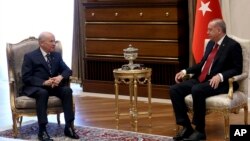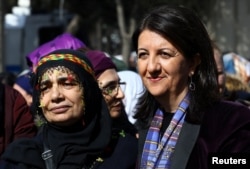Turkish President Recep Tayyip Erdogan on Wednesday called for early presidential and general elections on June 24 of this year. Polls had been scheduled for November 2019, but Erdogan said the unprecedented challenges facing the country made early elections a necessity.
"Be it the cross-border [military] operations in Syria, or incidents of historic importance in Syria and Iraq, they have made it imperative for Turkey to overcome uncertainties quickly," Erdogan told reporters at the presidential palace.
Last month, Turkish forces ousted a Kurdish militia from Syria's Afrin enclave. Ankara accuses the militia of supporting a Kurdish insurgency inside Turkey. The Afrin victory was seen as giving an electoral boost to Erdogan and his ruling party, the AKP.
Erdogan said Turkey remained in political limbo after a 2017 referendum in which the country chose to switch from a parliamentary system to an executive presidency. The reform takes effect after the next presidential election.
"Even though the president and the government are working in unison, the diseases of the old system confront us at every step we take," Erdogan said.
Analysts suggested Turkey's current economic growth, running at around 7 percent, explained Erdogan's call for early elections. "This is as good as it gets for the president with the economy. All it can do in the future is get more and more difficult. It was only a matter of time before he [Erdogan] realized this," said political analyst Atilla Yesilada of GlobalSource Partners, an economic and political analysis service for emerging markets investors.
Lira hit hard
Earlier this month, the Turkish lira suffered heavy declines in value amid growing concerns by international investors that the economy was overheating. The government has been pouring billions of dollars into the economy to maintain growth, a move analysts say is unsustainable.
With the economy seen as Erdogan's main electoral asset, rumors of early elections had been rife, despite strenuous denials by the president. The calling of the June elections means the campaign will fall in the holy month of Ramadan, when Muslims fast and do not drink during daylight hours. With Erdogan an observant Muslim and his party Islamist-rooted, the timing of the poll adds to speculation the president's hand was forced.
"The campaign will be in Ramadan, something he would not want to do," said political scientist Cengiz Aktar, "but he knows things are likely to get worse. Even now it won't be easy for him. It's clear all the opinion polls indicate he may not make it. This is why he is calling snap elections, so, yes, in a way it's a panic, the timing."
All the opposition parties have welcomed early elections. "If you made a decision [to hold an early election], we, as the HDP party, say, 'Bring it on.' We are ready for the election," said Pervin Buldan, one of the leaders of the pro-Kurdish HDP.
Early elections, however, could exclude the new IYI party because of a dispute over whether it would comply with Turkish rules that require parties to be established six months before an election date. "The Higher Electoral Board will decide the matter," Prime Minister Binali Yildirim said.
Critics are already crying foul, pointing out that the electoral board, or YSK, is packed with government appointees. Accusations are circulating that the choice of the election date is an attempt by Erdogan to thwart the IYI party.
The center-right IYI party, under its charismatic leader, Meral Aksener, is seen as posing a significant threat to Erdogan and the AKP. Aksener "is probably the most feasible candidate who has the highest chance to challenge Erdogan," said political scientist Aktar. "She is a new figure, even though she is an old politician, and she has created a certain sympathy within the country."
One poll shows a tie
Aksener has confirmed her intention to run for president and is now seeking to secure the required 100,000 signatures. The former interior minister has performed erratically in opinion polls, but one poll last month had her tied with Erdogan.
Given that many surveys indicate a closely fought election, opposition parties are questioning the security of the vote. Parliament on Wednesday extended emergency rule for a seventh time, following its introduction in the wake of a failed coup in 2016. Kemal Kilicdaroglu, leader of the main opposition CHP, condemned the move, saying elections could not be held under such restrictions.
In recent weeks, Kilicdaroglu has been meeting with opposition leaders to coordinate efforts to ensure ballot security. Last year's narrow referendum victory extending the presidency's powers was marred by controversy over voter fraud.
"It will be a very difficult, very risky election for Turkey. Already, there are extreme doubts about the security of the polling stations," said political scientist Aktar.





